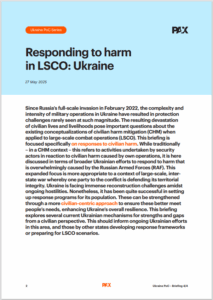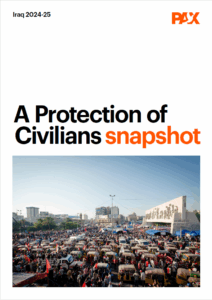Breaking stereotypes of conflict: City of Two Springs screenings
The historic city of Mosul, known as the city of Nabi Younis (Prophet Jonah), the ‘pearl of the north’ and the ‘city of a million soldiers’, is located at the bank of the Tigris river in the Iraqi governorate of Ninewa, 400 km northeast of Baghdad. However, in modern history, the city is recognised for where the self-proclaimed Islamic State of Iraq and the Levant (ISIL) declared their caliphate and for being their last stronghold in Iraq.
Having lived and worked in Iraq when the battle to retake Mosul was on-going and post-June 2017, the reconstruction phase started, I had been part of coordinating the humanitarian response for an International Non-Governmental Organisation (INGO) based in the country for 19 months. As a result of this work experience, PAX connected me to the filmmakers of the ‘City of Two Springs’, Frederick Mansell and Laurens Samson. The film follows the life of an eleven year old girl, Ala’a who has been displaced by the on-going fight in Mosul, documenting the challenges faced by a family living in a displacement camp and subsequently returning to their home, destroyed by the fighting. The film also brings in the perspective of Lise Grande who was then the Humanitarian Coordinator (HC) for the United Nations (UN) in Iraq, and the Dutch Ambassador, Jan Waltmans, both actively coordinating the humanitarian response in the city. The movie was screened in the Netherlands at the ‘Movies that Matter’ festival in the Hague, and at Leiden and Utrecht university. After each screening, I joined the filmmakers in the panel discussions, answering questions about the realities of war, the needs of civilians on the ground, and also highlighting how such responses need to be better coordinated.
Human aspect of war
Wanting to break stereotypes of images of the conflicts affected countries I have previously worked in, I was extremely pleased to see that this film is doing the same thing, bringing the human aspect of what it is like to be affected by war so personally, a perspective that is often missing from the accounts we see here in Europe. It shows the simplicity of what a little girl living in Mosul wishes for- to be able to see her grandparents who did not move with them, to be able to go back to her home, and to have a garden with flowers and fruit trees in her little backyard. Fleeing from your home with possessions that you can only carry on your back is devastating; living in a camp in a tent under the ferocious heat, which at the peak of the summers can go up to 52 ˚C in the shade is not easy; relying on handouts provided by INGOs in such a situation takes away ones pride.
Returning home
One of the most difficult phases in the displacement cycle is returning, which is unfortunately often not documented. The film shows the hefty destruction caused by the fighting in Mosul, with many of the houses and agricultural land still heavily mined. While many view this destruction to be caused by ISIL, the destruction of the buildings has actually been caused by carpet bombing by the US-led coalition. In Mosul, 75% of all airstrikes were on buildings, while this was 63% in Raqqa, Syria. These airstrikes were conducted by the US, UK, France, Australia and the Netherlands. While the coalition claims that these airstrikes caused 1.190 civilian casualties, the number is actually significantly higher- lying between 12.000 and 15.000.
As Wilbert van der Zeijden (PAX) also explained during the Q&A session, the strategy for retaking East and West Ninewa greatly differed. While in the East, the coalition provided human corridors for civilians to escape, this was not done in the West as many ISIL fighters had also escaped previously. In the West, the areas were besieged and bombed, harming far more civilians. Decisions like these are never easy, since in order to defeat armed terrorists entities like ISIL, a lot more civilian blood has been lost. Whether the ends justify the means is a difficult question, but we need to learn from these mistakes and strive to do better the next time. Civilians should not have to bear such a heavy price.
Accountability
It also brings in snippets of views of Iraqi youth in universities, holding international governments and donors to account. Even though Iraq is a middle income country and the donors do not want to pledge money for reconstruction and rehabilitation, Iraqi youth aptly pointed out that the western governments owe a lot of Iraq; it was the Iraqi blood that was lost against the battle to defeat ISIL. One should not forget that one of the reasons for the rise of ISIL was the initial takeover of Iraq by the US-led coalition in 2003 and the subsequent de-Ba’athification of the country’s military, defence and governmental institutions.
For now, we need to learn from past mistakes and engage in more meaningful dialogue for reconstruction in Iraq, addressing root problems of conflicts, lest it breakdowns under war again. Nearly 70% of post-conflict countries breakdown into conflict within five years. Frederick was pleased to show that Ala’a’s garden is doing well in Mosul, and we can only hope for a better future for her where she can continue going to school, and be proud of her lush green trees.
About Saba Azeem: Saba joined the Protection of Civilians team at PAX in February 2019 as an intern. Saba has been a development sector and humanitarian aid worker for over nine years. Apart from having working experience in her home country of Pakistan, she also has considerable working experience in Afghanistan, Syria, Jordan and Iraq.

